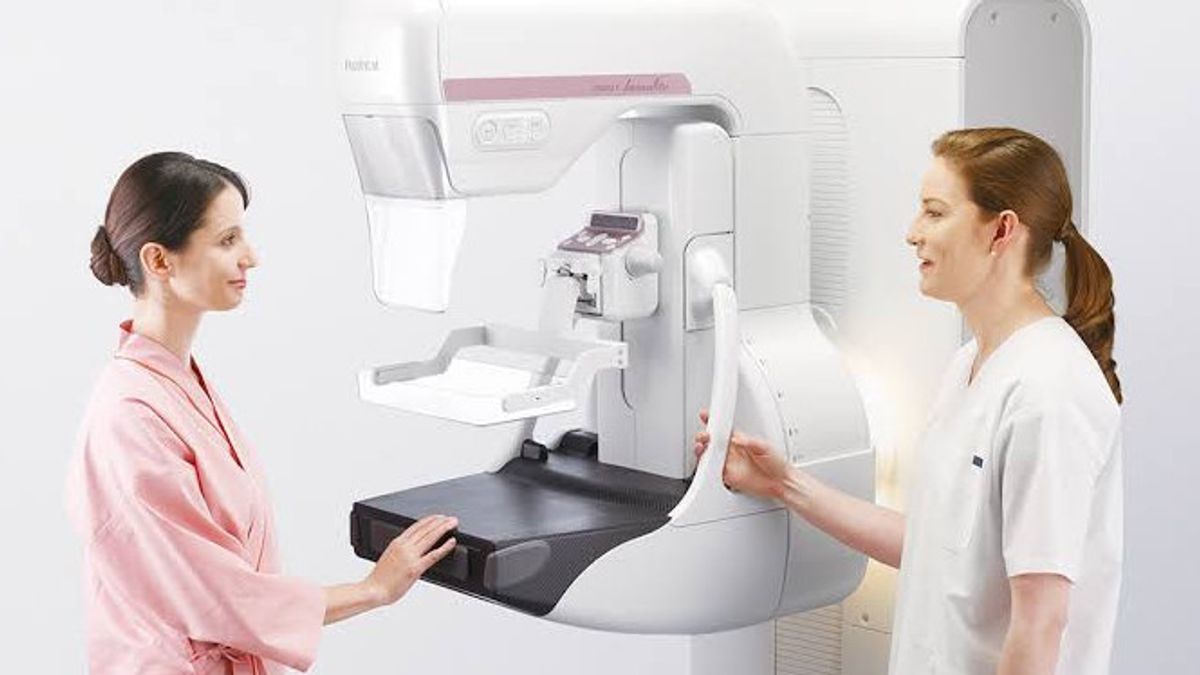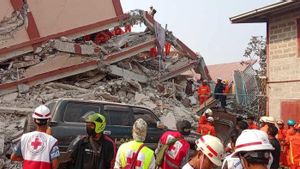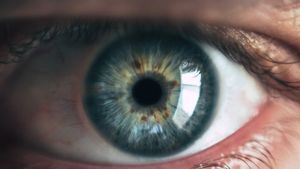JAKARTA - Who doesn't know Fujifilm? This photography giant has long been doing business diversification. One of the businesses that continues to be occupied and recording benefits for corporations is medical or health care technology. Fujifilm combines technological sophistication in the field of imaging or making films with technology products needed by the health industry.
President Director of Fujifilm Indonesia, Masato Yamamoto said, quality health check service technology will help facilitate the duties of health workers in diagnosing diseases so that they can make the right decisions.
"We hope that everyone can receive high-quality medical treatment," said Masato Yamamoto, in his statement, Thursday, December 29.
Fujifilm's history in the world of health has actually spanned a long period of time. In 1936, Fujifilm has started selling X-ray films. These corporate leaders are aware that the technology of making films or processing images is very sophisticated and is being hunted by many people. This technology will be very valuable when combined with health services where each product or machine really needs a film.
Taking advantage of this advantage, the company managed to expand its business in the diagnostic field through the Sinar X Radiology Diagnostic aircraft, ultrasound systems, endoscopy, in vitro diagnostic systems, CT, MRI, and PACS. Currently Fujifilm is expanding its services through the use of artificial intelligence or AI technology in its products.
According to Yamamoto, corporations see that clinical information will be increasingly needed in social life. For this reason, the need for AI technology is getting higher in developing products that meet the growing needs of the healthcare industry, especially in the post-pandemic era.
To develop AI technology in the medical field, Fujifilm collaborated to develop research with many parties. In April 2019, for example, Fujifilm, through a joint research by Kyoto University, announced that it has succeeded in developing technology that uses AI technology that is automatically capable of categorizing and measuring interstitial pneumonia lesions at a higher level of precision.
In this case Fujifilm started research studies by applying AI technology to help diagnose and assess patient treatment with pneumonia due to Covid-19. Another Fujifilm initiative also includes the development of AI platforms that can be used in emergency rooms, operating rooms, including during general X-ray examinations.
Fujifilm has a vision, not only to support radiologists but also doctors in the operating room and radiographers. Meanwhile, on the medical system line, Fujifilm has linked medical Informatics Technology as a health product and service such as the Sinar X Radiology Diagnostic, endoscopy, ultrasound, and in vitro diagnostic system.
Services and medical equipment that combine advanced technology are currently the main portfolio in Fujifilm's business transformation. Last July 2019, Fujifilm launched a medical software system in Japan. This platform studies the knowledge of experienced doctors regarding image diagnosis using AI technology.
With his expertise and sophistication, Fujifilm is also developing a Picture, Architecting and Communication System (PACS) series, an AI system capable of managing and storing image data in hospitals around the world.
Since its launch in 1999, at least this AI system has been used in 5,500 health facilities worldwide. Through more than 20 years of experience, this AI system image management and processing technology will be used in the development of AI Fujifilm technology in the future.
Through the AI system, Yamamoto said the company's experts analyzed Fujifilm's high-quality image data as an in-depth learning material to produce other innovations related to AI technology and the complete image/image.
He also emphasized that one of Fujifilm's concerns in the world of health is how patients can get medical treatment quickly, especially from the results of reading the diagnosis of x-ray images, such as the results of thorax or mamographic photos. One of the sophisticated tools that Fujifilm also produces is high-resolution emmography.
The mamographic technology or X-ray examination developed by Fujifilm is one of the concrete actions in the Never Stop Innovating move, a campaign that Fujifilm often echos in his work.
We know, breast cancer is the number one malignant tumor that is a scourge for women around the world. Therefore, early detection of breast cancer will have a significant impact on the level of life expectancy and the quality of life for those undergoing mamography.
Usually to detect breast cancer, doctors or oncologists will advise patients to do x-ray examination so that doctors can take the necessary actions optimally.
This was experienced by Anjani, a specialist in social media content, a patient who was diagnosed with breast cancer. Initially, Anjani felt something strange in her right breast, early 2021. Anjani did not care. The results of the mamographic test that she does every year always show negative results. But he admitted, throughout 2020 he did not carry out a mamographic test due to the COVID-19 pandemic.
However, over time he felt doubtful and finally took the decision to do an oncology doctor. From the oncology doctor, he was required to undergo a mamographic test to see if the picture of the breast glands and surrounding tissues were classified as tame or virulent.
After the mamographic test was carried out, it was discovered that the lump in his breast was classified as malignant and a more intense medical treatment had to be carried out by the oncology surgeon, namely the removal surgery (mastektomi) on his right breast.
From Anjani's experience above, the accurate results of the mamographic test on the depiction of malignant cells in the body will be able to determine the second life'' of a person with postoperative breast cancer. Because of the results of the mamographic test, doctors will be able to determine the next medical action that needs to be taken before it's too late.
This is where Fujifilm's mamography technology plays a role. This mamographic technology is recognized to contribute to early detection of breast cancer. With this mamographic technology, medical professionals or experts will be helped in early detection of abnormalities in the patient's body. Not only that, patients will be greatly helped to get a proper and accurate diagnosis of the disease they suffer from.
This goal is one of the reasons Fujifilm continues to increase its mamographic resolution and reduce the radiation load for patients in undergoing mamographic tests. This effort is carried out by utilizing x-ray imaging knowledge and image processing technology that has been developed for more than 80 years. "Fujifilm continues to develop mamographic technology to monitor the slightest abnormalities in the breast. We also provide soft digital mamographic equipment in patients with low radiation," he said.
One that can be relied on from Fujifilm's mamography technology is Digital Mammography. The medical equipment technology system, which can only be operated by professionals, uses a flat panel detector (FPD). This advanced innovation is able to produce a clear image through the use of X-rays with minimal doses and provide a speed of quality image results in just 15 seconds.
This system uses AEC software (i-AEC) combined with technology to automatically analyze images of each type of breast. In addition, Fujifilm's mamography technology also has a Mamographic QC, a technology that serves to manage quality control data on mamographic equipment centrally and faster. The use of this tool only takes about 10 minutes in Fujifilm's laboratory.
This control data will be more accurate with the help of Fujifilm FCR, which is the first radiographic tool capable of digitizing x-ray images in the world. The system can produce high resolution x-ray images with low radiation levels.
With this advanced technology, Yamamoto also ensures the level of safety of patients who use AI Fujifilm technology. Yamamoto said Fujifilm's uniqueness of AI technology is able to combine human intelligence (HI) approaches or human intelligence with artificial intelligence (AI) or artificial intelligence.
As a total healthcare company that has technology and knowledge contributed to public health, FUJIFILM services range from prevention, diagnosis, to treatment. In this case, FUJIFILM will continue to innovate to offer solutions and create healthier world order through technology products in the health sector that will support the performance of experts or professionals in the medical field.
The English, Chinese, Japanese, Arabic, and French versions are automatically generated by the AI. So there may still be inaccuracies in translating, please always see Indonesian as our main language. (system supported by DigitalSiber.id)










